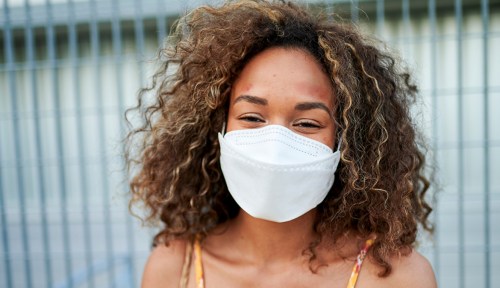advertisement
Is It Maskne, or Rosacea? An Expert Derm Shares Tips for Managing Both
Want to know what your skin's bumps and blemishes are caused by? Here's the difference between acne and rosacea, according to a dermatologist.

One of the in-the-grand-scheme-of-things-not-that-bad-but-in-the-moment-very-annoying side effects of 2020? Maskne.
And while bumps and blemishes on your face may be linked to wearing your trusty mask, if you have rosacea, you could also be having a rosacea flare. The icing on the cake? It’s common for adults to struggle with both. In fact, an estimated 16 million Americans have rosacea, and up to 50 million have acne, according to the American Academy of Dermatology.
“The reasoning is unknown, but rosacea often develops in adulthood, and hormonal fluctuations may play a role, which is often also a trigger for adult-onset acne,” says Rachel Nazarian, MD, FAAD, board-certified dermatologist in New York City.
You’d think it would be easy to tell the difference between the two, but that’s not always the case. “Both may appear as red bumps, pimples, deep cysts, and may have long-term damage to skin if left untreated,” Dr. Nazarian says, which is why she recommends visiting a dermatologist to figure out exactly what’s causing your bumps and blemishes.
“The treatment can be tricky since many acne medications may actually disrupt the skin balance that can then flare rosacea,” she says. “Having the assistance of a dermatologist trained in treating both is often the wisest step, and the quickest way to achieve clearer skin.”
If a patient has rosacea, they may benefit from a prescription treatment like ORACEA® (doxycycline, USP) Capsules 40 mg*, a once-daily pill that has been shown to help reduce the bumps and blemishes of rosacea.
Depending on which category your skin falls into, Dr. Nazarian shares tips to treat them below.
Scroll down for Dr. Nazarian’s tips for how to help treat flare ups, whether it’s rosacea or maskne.
What helps treat rosacea?
To start, simplify your skin-care routine. “Many times, the ingredients in your skin-care products may not be suitable for your skin type,” Dr. Nazarian says. “Start with the basics only: a gentle cleanser and moisturizer. This often will allow the skin to rebalance its pH and calm a rosacea flare.”
While those are steps you can take yourself, treating rosacea isn’t something you need to solve on your own. “Rather than delaying treatment, and risk worsening of skin disease and discomfort, scheduling an appointment with your board-certified dermatologist may help you with the struggles of rosacea, and help you achieve healthier skin sooner,” Dr. Nazarian says.
If you’re considering going the medication route, there are a few things to remember. Antibiotics are often prescribed for rosacea, but they can cause unwanted side effects like antibiotic resistance—which is actually a major health crisis right now. (According to the CDC, every year in the U.S. at least 2.8 million people get an antibiotic-resistant infection, and more than 35,000 people die.)
There is a non-antibiotic dose option that can help reduce the symptoms of rosacea and has been shown to not contribute to antibiotic resistance in a nine-month study: ORACEA® Capsules, which combats inflammation from the inside out to reduce the bumps and blemishes of rosacea through its anti-inflammatory properties.
Not sure when to consider medication? Dr. Nazarian suggests as soon as you’re concerned about your skin, it could be an option, so talk to your dermatologist. “Remember, untreated rosacea may have long-term consequences to skin and may damage the delicate skin tissue if neglected,” she says.
What helps treat maskne?
Answer honestly: If you wear a reusable mask, how often do you wash it? If the answer is “not that often,” that might be one of the reasons behind your maskne struggle. Dr. Nazarian recommends washing your mask frequently (like, every day), so stock up on a few to rotate while the others are in the laundry.
If switching out your masks for cleaner ones doesn’t clear up your skin (and it’s still bothering you), Dr. Nazarian suggests talking to your dermatologist about developing a nightly acne regimen. Smoother skin, coming right up.
Paid Content for Galderma
Top photo: Getty Images/F.J. Jimenez
*30 mg immediate release 10 mg delayed release beads.
Important Safety Information
Indication: ORACEA® (doxycycline, USP) 40 mg* Capsules are indicated for the treatment of only inflammatory lesions (papules and pustules) of rosacea in adult patients. ORACEA Capsules do not lessen the facial redness caused by rosacea.
Adverse Events: In controlled clinical studies, the most commonly reported adverse events (>2%) in patients treated with ORACEA Capsules were nasopharyngitis, sinusitis, diarrhea, hypertension and aspartate aminotransferase increase.
Warnings/Precautions: ORACEA Capsules should not be used to treat or prevent infections. ORACEA Capsules should not be taken by patients who have a known hypersensitivity to doxycycline or other tetracyclines. ORACEA Capsules should not be taken during pregnancy, by nursing mothers, or during tooth development (up to the age of 8 years). Although photosensitivity was not observed in clinical trials, ORACEA Capsules patients should minimize or avoid exposure to natural or artificial sunlight. The efficacy of ORACEA Capsules treatment beyond 16 weeks and safety beyond 9 months have not been established.
Sign Up for Our Daily Newsletter
Get all the latest in wellness, trends, food, fitness, beauty, and more delivered right to your inbox.
Got it, you've been added to our email list.




